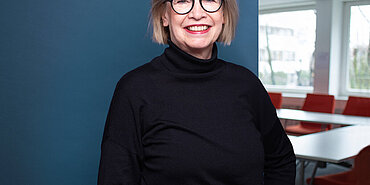With images of the dramatic events of the past days, weeks and months in mind – the war in Syria and the resulting waves of refugees, the terrorist attacks in Paris, the repressions in Egypt and the state of emergency called in Tunisia – the attendees at the multilateral conference, sponsored by Germany’s Federal Foreign Office, engaged in a series of passionate debates on the impact of international youth exchanges on democracy and civil society.
“There is no tradition of jihad in my country,” said a participant from Tunisia. “The terrorists are young people who came to Europe full of hope, found themselves in a precarious situation and were radicalised in mosques by imams from Pakistan, Afghanistan or Saudi Arabia. They are bringing terrorism to Europe and back to us in their countries of origin. This is a problem that we all share and which we can only solve together.”
Statements like this demonstrate how relevant the dialogue with North Africa is today, and how urgently it is needed. Youth work is designed for young people in precarious situations, and international youth work is designed to break down prejudices and enemy stereotypes. International youth work alone cannot banish terrorism, but it can open up new horizons for young people, help them take their fate in their own hands, and empower them to find their place in a shared world. Participants in the Bonn conference on North Africa kept coming back over the 2½ days of the event to the need to join forces to tackle common challenges, in part by addressing the relevant questions and proposals to policymakers.
Taking stock
“How have youth and expert exchange schemes developed since the Arab Spring, and how have they affected the advancement of democracy and the development of civil society?” asked IJAB Director Marie-Luise Dreber in her keynote address. Together with the participants from Tunisia, Morocco, Egypt and Germany, she wanted to review developments thus far and attempt an outlook on the future. But participants’ opinions already differed on the terminology. Democracy, civil society, human rights – no one at the conference called these values into question, and there is for the most part a common understanding of what they mean. Given the conditions in their own countries, however, the participants tend to think in smaller steps and bristled at the idea that threats to democracy and human rights are a problem that is exclusive to their homelands.
Moderator Eike Totter gave the attendees an opportunity to present their organisation, their project and the conditions under which they work on a poster. This was important, because although most North African participants have a German partner who was also present at the conference, the North Africans did not know one another, nor did anyone in the room have an overview of all the projects.
“What has gone well so far?” Totter asked the project representatives. Quite a few things, as it turned out. BUND – Friends of the Earth Germany worked with its Tunisian partner to protect the forests of the Atlas Mountains, and both organisations forged links with Tunisian civil society and public authorities. The Gustav Stresemann Institute took part in “Cultural Committees” in Egypt that were able to mediate between Christians and Muslims. The staff of the youth centre in Osterholz-Scharmbeck were gratified to see their young people return from Morocco transformed. Volunteers from Cologne teamed up with Tunisian volunteers to launch urban gardening projects in garbage-strewn wastelands in Tunis. Many more success stories were recounted. But there are also obstacles – small ones, which could be solved through better coordination and support, but also larger ones, which cannot be eliminated by the project partners alone because they are associated with the very framework within which the transformation partnerships and international youth work operate.
“We work under conditions that actually make it impossible to do what we do,” concluded moderator Eike Totter, summarising the mood amongst the participants. The challenges include the various problems in obtaining visas, contradictory statements on participation by disadvantaged youth, and the lack of follow-up financing and long-term prospects beyond the end of the transformation partnerships, which will expire in 2017. Some issues do not necessarily affect each individual project but do have an impact on the overall strengthening of civil society, such as the lack of rapport between project partners within the programme countries.
Participants issue recommendations
The conference proved to be a constructive process. “Your openness to dialogue made this possible,” IJAB Director Marie-Luise Dreber later commented on the event. First in small groups and then in the plenary session, possible points for incorporation in a recommendation paper were gathered and discussed. The result was a document that can lay claim to coming straight out of genuine practice in youth and expert exchanges, reflecting the experiences of the projects funded through the transformation partnerships, and offering solutions.
Among the recommendations was the desire that support for civil society must be offered regardless of the actions of the governments of the North African partner countries. Information about the grant programme, its progress and the funded projects must be made transparent and publicly available. Research funding for the evaluation of projects would also be helpful. IJAB will be combining these and many more points to produce a long-term vision for the German-North African exchange scheme, for discussion with the German Foreign Office and policymakers. The paper will be published shortly on ijab.de, along with best-practice recommendations that can be incorporated into youth and expert exchanges, regardless of the respective framework conditions.
Many positive comments were voiced during the final session of the conference. Virtually all participants called for another networking meeting in the coming year, and the North African participants strongly advocated a get-together in their home countries. “Come visit us so you can see for yourself what it’s like,” they said – an invitation that the German participants were delighted to receive.



